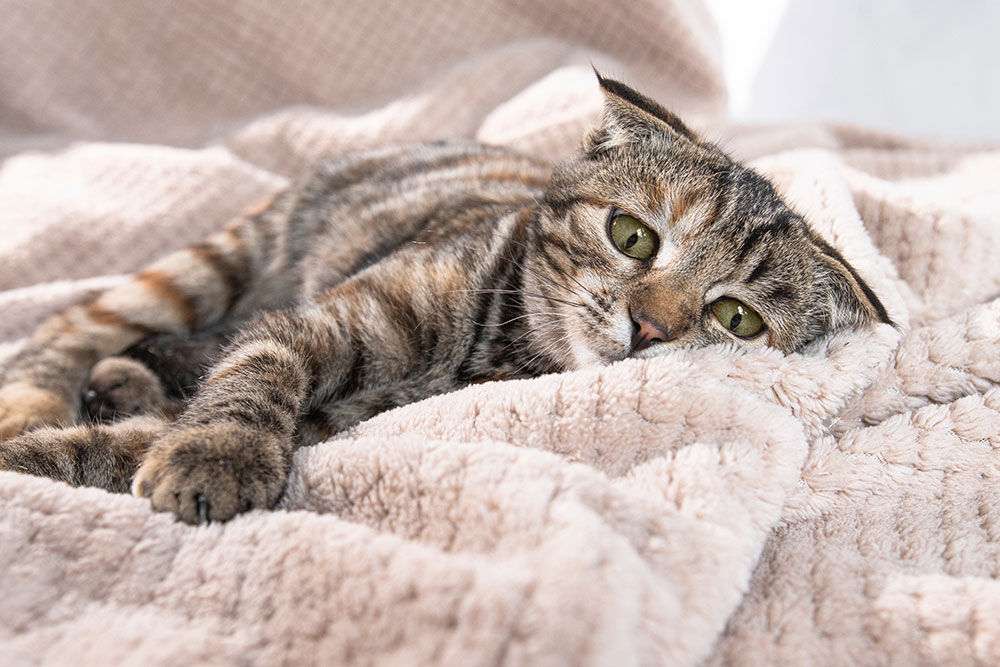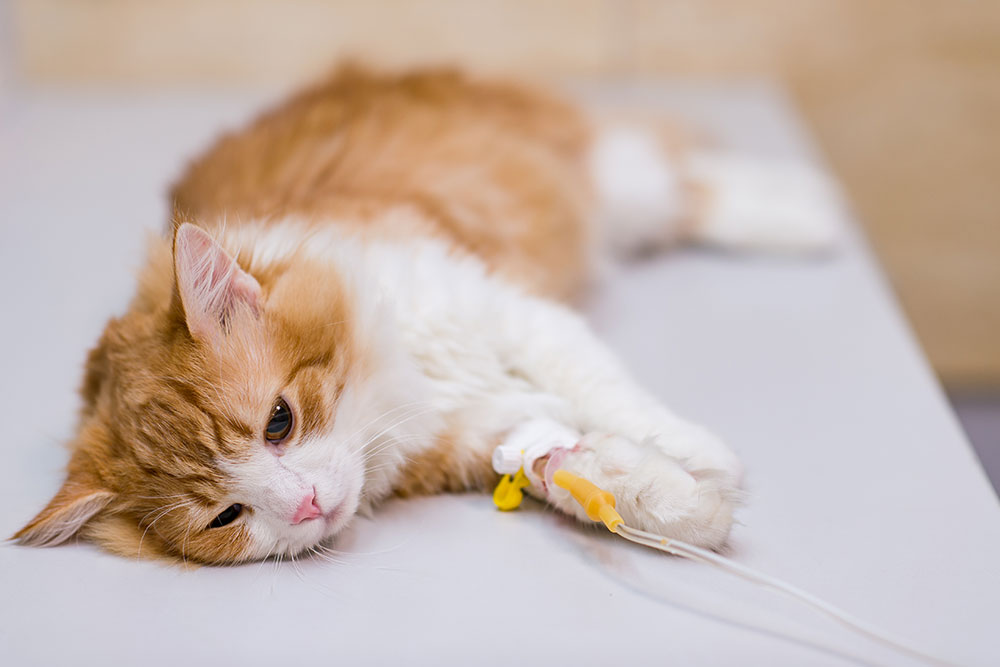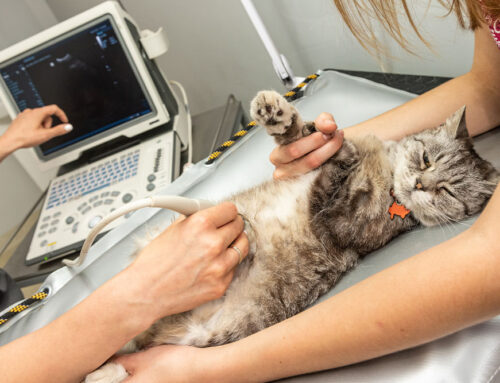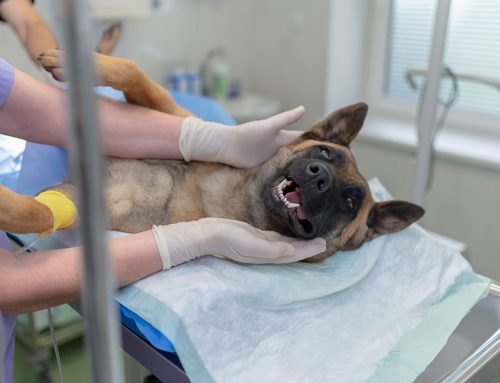Helping Senior Cats Thrive: Managing Common Aging Conditions
Your cat may still leap for the windowsill or curl up beside you every night, but subtle changes in weight, stiffness, or thirst can signal age-related conditions like arthritis, kidney disease, or hyperthyroidism. These issues often progress slowly, making them difficult to spot until they’re advanced.
The good news is that with early detection and consistent support, many aging cats can enjoy long, comfortable lives. The team at Burlington Veterinary Center takes a Fear Free and Cat Friendly approach, combining traditional medicine with acupuncture, laser therapy, and massage to help senior cats thrive.
Understanding Common Aging Cat Diseases
As cats age, their bodies undergo changes that make them more vulnerable to certain health conditions. Recognizing early warning signs – and knowing how these conditions are managed – can make all the difference in preserving your cat’s comfort and quality of life.
Arthritis and Joint Health in Cats
Arthritis affects up to 90% of cats over 12 years old, yet many owners miss the subtle signs. Unlike dogs, cats rarely limp. Instead, look for:
- Difficulty jumping onto furniture
- Reluctance to use stairs
- Decreased grooming, especially around the hindquarters
- Changes in litter box habits
Maintaining a healthy weight is crucial for joint health since even one extra pound can strain arthritic joints. Supplements containing glucosamine, chondroitin, or omega-3 fatty acids can help protect cartilage and reduce inflammation.
Your veterinarian may also recommend anti-inflammatory medications, laser therapy, acupuncture, or gentle physical therapy to improve comfort and mobility. For severe arthritis, lifestyle modifications like soft bedding, ramps, and low-entry litter boxes make daily life easier.
Chronic Kidney Disease in Cats
Chronic kidney disease (CKD) affects about one in three senior cats. Early signs include increased thirst and urination, gradual weight loss, decreased appetite, and lethargy – often mistaken for “normal aging.”
Because lost kidney function cannot be restored, management focuses on slowing progression and reducing symptoms. Therapeutic renal diets are low in phosphorus and protein, which help reduce kidney workload. Regular subcutaneous fluids maintain hydration and flush toxins, while medications like phosphate binders or anti-nausea drugs improve appetite and comfort.
Routine blood work and urine testing allow veterinarians to adjust care over time, helping cats with CKD live comfortably for years.
Hyperthyroidism in Cats
Hyperthyroidism can appear paradoxical – cats eat more yet lose weight. They may seem hyperactive, vocal, or anxious, and often develop a poor coat.
If untreated, hyperthyroidism can lead to heart disease and high blood pressure. Fortunately, several effective treatments exist. Daily oral or transdermal medications (like methimazole) can regulate thyroid hormone levels. Prescription low-iodine diets help in mild cases, while radioactive iodine therapy (I-131) offers a permanent cure by targeting overactive thyroid tissue. In select cases, surgical removal of the affected gland is recommended.
Regular monitoring of thyroid hormone levels and blood pressure ensures treatment remains balanced and effective.
Behavioral Changes and Cognitive Decline
As cats grow older, subtle changes in behavior, mobility, or routine can reveal underlying medical or cognitive changes. Increased vocalization, altered sleep cycles, or confusion may signal pain, sensory loss, or feline cognitive dysfunction (similar to dementia).
Common signs of cognitive decline include disorientation, house soiling, and decreased responsiveness. While not reversible, management focuses on comfort and consistency. Nutritional supplements containing antioxidants and omega-3s may support brain health. Environmental enrichment – puzzle feeders, gentle play, and familiar scents – helps keep your cat engaged.
For cats with anxiety or nighttime restlessness, veterinarians may prescribe calming medications or recommend pheromone therapy to ease stress.
Dental Care for Senior Cats
Oral health has a direct impact on your cat’s comfort and longevity. Dental disease causes pain, tooth loss, and may contribute to heart, liver, or kidney problems.
Routine veterinary exams and professional dental cleanings under anesthesia allow veterinarians to remove plaque and assess teeth below the gumline. In advanced cases, extractions relieve chronic pain and infection.
At home, dental diets, enzymatic water additives, and daily tooth brushing help slow tartar buildup. Your veterinarian can recommend safe products designed specifically for cats.
With consistent professional and home dental care, many cats maintain strong, pain-free teeth well into their senior years.
Integrative Approaches to Support Aging Cats
Combining conventional treatments with our clinic’s complementary therapies can help senior cats stay comfortable and active.
Acupuncture and Herbal Therapy
Acupuncture supports cats with chronic pain, arthritis, and general wellness needs by stimulating natural healing and improving circulation. Many cats relax during sessions, and effects often last for weeks.
Traditional Chinese Veterinary Medicine (TCVM) complements modern medicine by addressing the body as a whole rather than just treating symptoms. Herbal formulas, acupuncture, and diet therapy can all enhance comfort and balance in aging cats.
Laser Therapy for Senior Cats
Laser therapy uses targeted light to reduce inflammation, increase circulation, and accelerate healing. It is especially beneficial for arthritis, post-surgical recovery, and wound healing.
Sessions are quick- typically 5 to 15 minutes- and most cats enjoy the gentle warmth. Laser therapy provides effective pain relief without drugs or side effects.
Massage Therapy for Older Cats
Therapeutic massage does more than relax your cat- it improves circulation, eases muscle tension, and reduces stress. Feline massage techniques use gentle pressure and short sessions to match cats’ sensitivity.
Regular massage can support flexibility, relieve stiffness, and deepen the bond between cat and caregiver. Even cautious cats often grow to enjoy the routine with patience and consistency.
Senior Cat Wellness Essentials: Stress-Free Care, Better Outcomes
Veterinary visits can be stressful for cats, especially those with chronic health conditions. Reducing fear improves exam accuracy and treatment success.

Fear Free and Cat Friendly Care
At Burlington Veterinary Center, Fear Free practices ensure calm, gentle handling, soothing pheromones, and an environment tailored to your cat’s comfort.
Our Cat Friendly certification provides separate waiting areas, feline-focused exam rooms, and staff trained in low-stress handling techniques that make visits smoother for everyone.
Importance of Regular Check-Ups
Preventive testing for senior cats helps uncover disease before it becomes advanced. Blood work identifies kidney disease, hyperthyroidism, or diabetes, while blood pressure checks detect hypertension- a common issue in older pets.
Burlington Veterinary Center’s diagnostic tools include ultrasound, digital radiography, and in-house lab testing, allowing us to detect problems early and adjust care for your cat’s changing needs.
Supporting Your Senior Cat’s Quality of Life
Supporting your older cat doesn’t have to be complicated. Small adjustments can make a big difference in daily comfort:
- Ramps or steps to reach favorite spots
- Soft, heated bedding for sore joints
- Low-sided litter boxes for easy access
These simple home modifications can greatly improve comfort and mobility as your cat ages.
Your Next Steps in Senior Cat Care
Early recognition and proactive management can significantly improve your cat’s comfort and longevity. If you notice weight loss, increased thirst, stiffness, or new behaviors, schedule a veterinary exam.
Burlington Veterinary Center offers comprehensive senior cat care with a blend of traditional medicine and integrative therapies. Call us at (860) 675-6009 or schedule an appointment to plan your cat’s senior wellness care. Our compassionate team is here to help your cat enjoy their golden years in comfort and good health.







Leave A Comment